September 15, 2023
Air Date: September 15, 2023
FULL SHOW
SEGMENTS
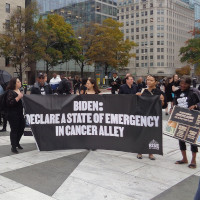
EPA Charged With Reverse Discrimination
View the page for this story
In 2022 the US EPA opened a civil rights investigation into whether the State of Louisiana overburdens Black communities along “Cancer Alley” with toxic industries. But EPA and the Department of Justice abruptly closed the inquiry when the Louisiana attorney general filed a suit charging reverse discrimination. Monique Harden of the Deep South Center for Environmental Justice joins Host Steve Curwood to discuss the role of industry in the suit and the progress towards environmental justice that could have been made. (13:59)
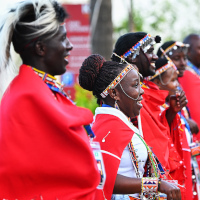
Turning Up the Heat on Climate Finance
View the page for this story
Africa has emitted a tiny fraction of the greenhouse gas emissions from the more developed parts of the world but is experiencing catastrophic impacts with little ability to adapt. Alden Meyer of E3G joins Host Jenni Doering to explain how climate finance was a focus of the recent Africa Climate Summit, which took place in advance of the Climate Ambition Summit that UN Secretary General Antonio Guterres is convening in New York on September 20th. (09:36)
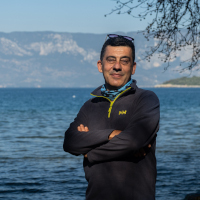
Protecting Mediterranean Sea Life
View the page for this story
Overfishing, warming oceans, invasive species, and unsustainable tourism threaten the rich marine life in the Mediterranean. So Turkish civil engineer and diver Zafer Kizilkaya got together with local fishermen to pilot a community-run Marine Protected Area that led to expanded marine conservation in Turkey. Mr. Kizilkaya was awarded the 2023 Goldman Environmental Prize for Asia for his work, and he joined Living on Earth’s Bobby Bascomb. (08:15)
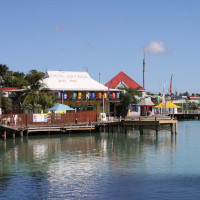
Beyond the Headlines
/ Peter DykstraView the page for this story
This week, Living on Earth contributor Peter Dykstra joins Host Jenni Doering to share how small island nations are making a case for planet-warming greenhouse gases to be considered ocean pollutants. Also, the EPA delays setting new standards for ozone, a major air pollutant. And in history, they look back to 1992 when the first African American woman went to space. (04:37)

Enduring Against Seemingly Impossible Odds
View the page for this story
In remembrance of Roz Zander we present a story to highlight her work on possibility.In 1914, British explorer Ernest Shackleton and his crew of 27 men set sail for Antarctica. Disaster struck when their ship the “Endurance” became trapped in pack ice and later broke up, yet the entire crew persevered. Rosamund Zander, the author of Pathways to Possibility: Transforming Our Relationship to Ourselves, Each Other, and the World, recently passed away and joined Host Steve Curwood in 2020 to talk about how we can harness the power of optimism to carry us through difficult times. (11:00)
Show Credits and Funders
Show Transcript
230915 Transcript
HOSTS: Steve Curwood, Jenni Doering
GUESTS: Monique Harden, Zafer Kizilkaya, Alden Meyer, Roz Zander
REPORTERS: Peter Dykstra
[THEME]
CURWOOD: From PRX – this is Living On Earth.
[THEME]
CURWOOD: I’m Steve Curwood.
DOERING: And I’m Jenni Doering
The Louisiana state government is in denial about environmental racism.
HARDEN: Anyone looking at Louisiana and Cancer Alley can see the race of the people who have the most to put up with when it comes to industrial pollution and hazards. It’s predominantly Black residents, for generations now.
CURWOOD: Also, the UN Climate Ambition Summit wants nations to make bold commitments.
MEYER: We're seeing some momentum building up now around this goal of tripling renewable energy capacity by the end of the decade which would be a fairly significant development but a lot still remains to be seen about what exactly will come out of this summit next Wednesday and so we'll be watching this with great interest.
CURWOOD: Those stories and more, this week on Living on Earth – Stick Around!
[THEME]
CURWOOD: From PRX – this is Living On Earth.
[THEME]
CURWOOD: I’m Steve Curwood.
DOERING: And I’m Jenni Doering
The Louisiana state government is in denial about environmental racism.
HARDEN: Anyone looking at Louisiana and Cancer Alley can see the race of the people who have the most to put up with when it comes to industrial pollution and hazards. It’s predominantly Black residents, for generations now.
CURWOOD: Also, the UN Climate Ambition Summit wants nations to make bold commitments.
MEYER: We're seeing some momentum building up now around this goal of tripling renewable energy capacity by the end of the decade which would be a fairly significant development but a lot still remains to be seen about what exactly will come out of this summit next Wednesday and so we'll be watching this with great interest.
CURWOOD: Those stories and more, this week on Living on Earth – Stick Around!
EPA Charged With Reverse Discrimination
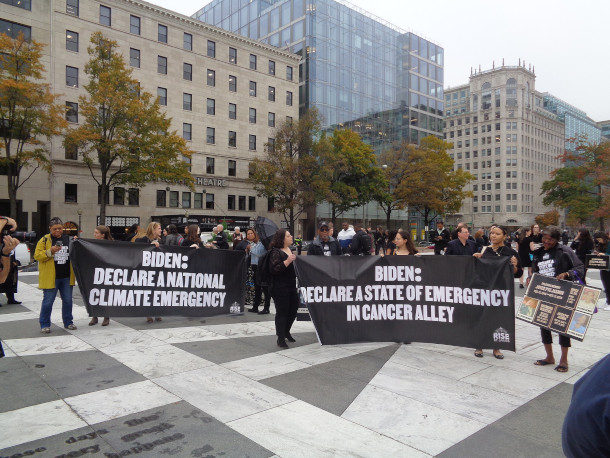
Members of environmental justice advocacy group RISE St. James march from Freedom Plaza to White House in October 2022 (Photo: Frypie, Wikimedia Commons, CC BY-SA 4.0)
DOERING: From PRX and the Jennifer and Ted Stanley Studios at the University of Massachusetts, Boston this is Living on Earth. I’m Jenni Doering.
CURWOOD: And I’m Steve Curwood.
With the Black people of Louisiana effectively blocked from the ballot box until the voting rights laws of the 1960’s many industrial plants along the lower Mississippi River were built in their communities without their consent. Today there are more than 150 petrochemical and other polluting plants along what’s called Cancer Alley between Baton Rouge and New Orleans. And while black people now can vote in Louisiana, the pattern and practice of siting plants with toxic emissions in black neighborhoods on the river continues to this day. In response to allegations of these inequities in 2022 the US EPA began a civil rights investigation into the State of Louisiana’s permitting and monitoring of toxic industries. But as new rules were being hammered out to reform lax enforcement and lessen the toxic burden on BIPOC communities, the EPA abruptly halted its investigation when the Louisiana attorney general filed a suit charging reverse discrimination. Joining us now with more is Monique Harden, the law director for the Deep South Center for Environmental Justice based in New Orleans. Welcome back to living on Earth, Monique!
HARDEN: Hi, it's great to be back.
CURWOOD: What kind of changes were environmental justice advocates like yourself hoping that this investigation could bring?
HARDEN: Well, I mean, we were, of course, cheering on the communities in bringing their civil rights complaints forward to EPA, and in EPA accepting them and opening up the investigation. This is something that we had been calling for, for a while, that there should be targeted civil rights investigations in Louisiana's Cancer Alley and other toxic hotspots where Black and other people of color suffer the consequences of that pollution. So this was a good start and progress that was, you know, long overdue in Louisiana and from our Environmental Protection Agency. You know, I'm sure as your listeners know, as a federal agency, the Environmental Protection Agency has a legal obligation under Title VI of the Civil Rights Act to ensure that the dollars that it allocates to the states, like to a Louisiana Department of Environmental Quality, do not wind up in discriminating against people on the basis of race, color, or national origin. So the EPA gives a lot of money to our state agencies across the country to operate permitting programs and to conduct monitoring of the environment and to ensure compliance or take enforcement action. And what you see, how those dollars are spent, is in a way that it really harms Black communities here in Louisiana.
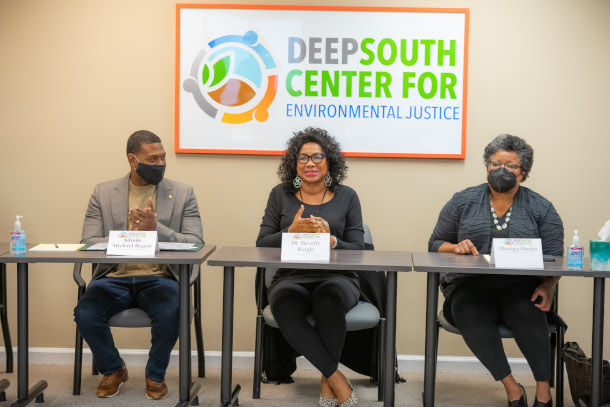
From left: US EPA Administrator Michael Regan, Deep South Center for Environmental Justice Executive Director Dr. Beverly Wright, and DSCEJ Director of Law and Policy Monique Harden during the “Journey to Justice” tour in 2021. (Photo: Eric Vance, US Environmental Protection Agency, Flickr, public domain)
CURWOOD: Now, when President Biden came into office, he made a lot of noise about dealing with environmental justice issues. He sent EPA Administrator Michael Regan to Cancer Alley early in 2021 on the "Journey to Justice" tour, and yet the EPA seems to be ducking out on this one, what's going on now?
HARDEN: Well, it's a little complicated. Because what President Biden did, and the administration was set new policies to strengthen the federal government departments and agencies and offices to incorporate the work of ensuring environmental justice, to delivering environmental justice and tackling climate change, as per the executive order President Biden signed after inauguration. Michael Regan, who President Biden appointed to be the Administrator of the US Environmental Protection Agency, went on visits into Louisiana in particular, but also other communities in the South, to meet with folks who are battling for environmental justice. And he made a number of commitments, quite strong ones, that led to the civil rights investigation. And to the credit of EPA, they were able to nail down specific terms that would really have been, set a new trajectory around environmental justice when it comes to the actions and the decisions at the Department of Environmental Quality, as well as our State Department of Health and Hospitals, that would ensure health in a real, practical way, which is by reducing and avoiding pollution. That all stopped when our Louisiana State Attorney General Jeff Landry filed a lawsuit in a federal court that's far and away on the other side of the state from where St. John Parish and St. James Parish and Louisiana's Cancer Alley are located. But he chose that particular court, because I think he thought that this is where he would find some success in attacking civil rights protections and calling on the judge of the federal court to shut down the EPA's civil rights investigation and the work that was being done to develop terms for course correction at the two state departments, of environmental quality and the other one on health and hospitals.
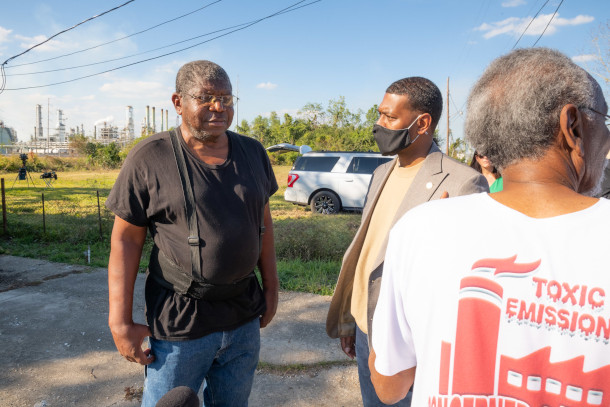
US EPA Administrator Michael Regan consults with local Black communities in Cancer Alley during his “Journey to Justice” tour in 2021. (Photo: Eric Vance, US Environmental Protection Agency, Flickr, public domain)
CURWOOD: Monique Harden, we looked at the lawsuit that Louisiana Attorney General Jeff Landry filed, and in that complaint, he writes, "Officials have lost sight of the agency's actual environmental mission and instead decided to moonlight as social justice warriors fixated on race." And the quote continues, "EPA frequently does not care about the content of air and water emissions, but only the color of the skin of those proximate to them." What's your reaction to that complaint?
HARDEN: It's an obnoxious attack on civil rights and environmental justice. And it makes me think, like, you know, we've stepped back into the 1940s or the 1950s, when there was so much resistance to freedom and equality and civil rights in this country. And the promise of the civil rights movement is to ensure that no one is discriminated against on the basis of race, color, or national origin. And what the state attorney general has a problem with is that stopping discrimination, for him, is the problem.
CURWOOD: The Attorney General's complaint makes it sound like this is racism against white people, to regulate this way.
HARDEN: It strains to make that kind of argument, but anyone looking at Louisiana and Cancer Alley can see the race of the people who have the most to put up with when it comes to industrial pollution and hazards. It's predominantly Black residents, for generations now. And instead of dealing with that, and figuring out a just remedy for that, this is what the state attorney general has chosen to do, with the help of attorneys who represent one of the companies that is the subject of the civil rights complaint, a company called Formosa. So there's a real ethical problem in terms of the serious conflict of interest that exists in this lawsuit brought by the Louisiana State Attorney General because of the contract and agreement and monies paid to attorneys representing one of the companies that is the subject of the civil rights complaint.
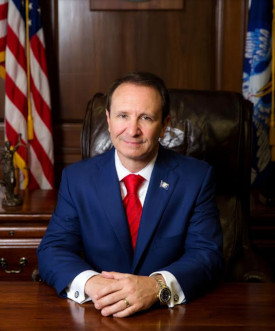
Louisiana Attorney General Jeff Landry, who filed the reverse discrimination complaint that halted EPA’s civil rights investigation in Cancer Alley, is running for Louisiana Governor in the November 2023 election. (Photo: Louisiana State Attorney General’s Office, public domain)
CURWOOD: By the way, Monique, what was in the deal that got spiked, I mean, what was the kind of progress that had been made by the EPA, in getting the Louisiana Department of Environmental Quality to negotiate on these issues of dealing with extra burden on communities of color?
HARDEN: Milestones that would have been reached with this agreement is, one, obligating the Department of Environmental Quality to deny a permit for a new facility or an expansion of an existing facility, on the grounds that it would result in racial discrimination, it would cause disproportionate pollution burdens based on race. It would require a transformation in how the agency goes about making a permit decision that would require a look at all of the various factors taking place in a community that contribute to poor environmental and public health conditions for residents. That's also known as cumulative impact analysis. So that was another key agreement that was reached before Attorney General Landry and the Formosa attorneys stepped in to put the kibosh on EPA's civil rights investigation and the work towards these new settlement terms.
CURWOOD: What kind of money might be at stake in this in terms of industry? I mean, what's the pipeline in Cancer Alley in terms of things like plastic production plants and natural gas pipelines, storage facilities, and so on?
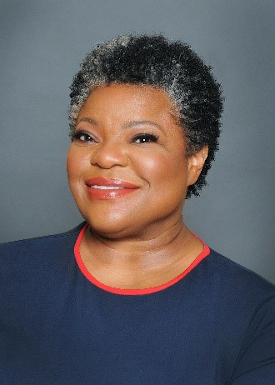
Monique Harden is the Director of Law and Policy and Community Engagement Program Manager at the Deep South Center for Environmental Justice. (Photo: Courtesy of Deep South Center for Environmental Justice)
HARDEN: Wow. Well, you know, Steve, that's a very important question, because you're talking billions and billions of dollars of projects, that each one has its own serious level of hazards and risks for both communities, health and safety, our environment, and certainly our climate. We're talking about dozens of industrial facilities that are targeting Louisiana for a whole new wave of gas production facilities, hydrogen, ammonia gas, liquefied natural gas plants, and a number of plastic production -- which are also, use a gas feedstock in the production. So when you consider the fact that each of those facilities would need to apply for a permit in order to construct or build the facility. And that those permits set forth various, you know, environmental requirements, what the civil rights settlement agreement was contemplating was another level of considerations on any proposed industrial facility that would have to countenance racial discrimination and avoid it. And when you're thinking about those projects, and they're targeting mostly Black communities here in Louisiana, this kind of a settlement agreement would probably give them more than pause around their plans and their investment dreams and opportunities that they see for themselves and shareholders. And so there's a lot of industrial interest in seeing that civil rights protections don't get rooted in Louisiana when it comes to environmental protection.
CURWOOD: I'm confused. President Biden made so much noise about environmental justice, and yet his Environmental Protection Agency really kind of folded its tent in the face of opposition from the state of Louisiana. Why are they abandoning this investigation?
HARDEN: Well, I think it's, it's important to know that while EPA began and had undertaken this civil rights investigation, the decision to not continue the investigation and to move forward the settlement agreement really came from the Department of Justice, when it filed a Notice of Resolution in the Western District Court in response to the lawsuit filed by Attorney General Jeff Landry. And that decision is one that is, it's galling, because it concedes and gives up the fight for civil rights here in Louisiana by the Department of Justice, because there's nothing resolved. The problems of environmental racism continue.
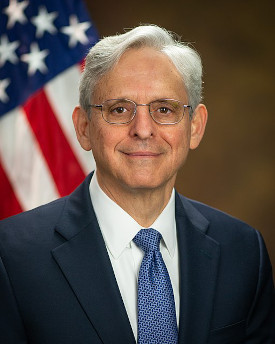
US Attorney General Merrick Garland (Photo: U.S. Department of Justice, Wikimedia Commons, public domain)
CURWOOD: By the way, I'm looking at the calendar, there's a presidential election coming. The man who won last time needed the BIPOC vote to get over the top. How is this going to affect people's willingness to go out and and work for President Biden if his Department of Justice is willing to throw environmental justice under the bus?
HARDEN: Well, you know, there is a separation between the President and the Department of Justice. Let me just say this, is that the real problem here is where Merrick Garland stands on environmental justice. We know where President Biden stands. Where does Merrick Garland stand? And the decision for the Department of Justice, without so much as a, you know, a meeting with the community groups to find out, you know, what is this all about? What's at stake? How can they step up and address these concerns? Instead, just summarily filed this Notice of Resolution with the Western District federal court, when there is no resolution. And in fact, there's more dissonance and cacophony and chaos and crisis brought about since the lawsuit was filed. We're far from resolution, and that, I think, speaks to the need for bold leadership on the part of Merrick Garland. The work of justice is not just within the criminal justice and police violence area. It's there, we all know it and we see it, but it's also in the context of environmental protection where communities for generations have lived with cancer causing chemicals in the air they breathe, water that's unsafe to drink, land that's contaminated. And we need a Department of Justice that takes that seriously as well, and picks up the mantle and fights at least as hard as communities are fighting for where they live and for their future.
CURWOOD: Monique Harden is Director of Law and Policy at the Deep South Center for Environmental Justice. Thanks so much for taking the time with us, Counselor.
HARDEN: Thank you, Steve, as always.
CURWOOD: To date the Louisiana attorney general’s office has yet to respond to our queries.
Related links:
- WWNO | “Shuttered EPA Investigation Could’ve Brought ‘Meaningful Reform’ in Cancer Alley, Documents Reveal”
- Read the Louisiana Attorney General’s complaint against EPA
- Read the draft settlement agreement between the Louisiana Department of Environmental Quality and US EPA
- Learn about environmental justice and Title VI of the Civil Rights Act of 1964
- About Monique Harden
[MUSIC: Raful Neal, “Been So Long” on Louisiana Blues, X5 Music Group]
DOERING: Coming up, the power of nature reserves in the seas. Stay tuned!
ANNOUNCER: Support for Living on Earth comes from Sailors for the Sea and Oceana. Helping boaters race clean, sail green and protect the seas they love. More information @sailorsforthesea.org.
[CUTAWAY MUSIC: Biff Smith et al, “Smoke & Mirrors” on Along Came Betty, by Biff Smith, Along Came Betty Music]
Turning Up the Heat on Climate Finance
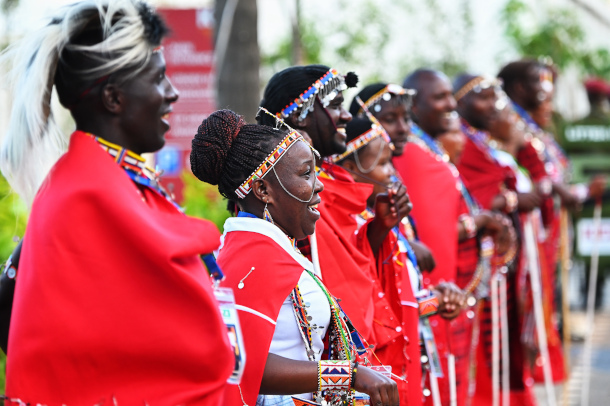
Kenyan people in traditional dress during the visit of Ursula von der Leyen, President of the European Commission, to Nairobi, Kenya where she participated in the Africa Climate Summit on September 5th, 2023. (Photo: Dati Bento, European Union, EC, Fair Use)
DOERING: It’s Living on Earth, I’m Jenni Doering
CURWOOD: And I’m Steve Curwood.
The world’s presidents, prime ministers and royal heads of state are set to gather in New York for the opening of the United Nations General Assembly where on September 20th UN Secretary General Antonio Guterres plans to convene a Climate Ambition Summit. The Secretary General has dubbed the growing climate emergency ‘global boiling’ and is warning time is rapidly running out to avoid catastrophe. The day-long UN Climate Summit will give nations the chance to announce new commitments to reduce climate disrupting emissions.
DOERING: Disasters linked to the warming Earth are now routine around the world, and North Africa recently became the latest region to suffer extreme flooding that killed as many as twenty thousand Libyans. Africa is almost defenseless to climate disruption, though that continent has emitted just a tiny fraction of the historical greenhouse gas emissions from the more developed parts of the world. So, equity was a focus in early September in Nairobi, Kenya where Kenyan President William Ruto led the first Africa Climate summit with two dozen or so other national leaders, including the presidents of Libya, Tanzania and Senegal, while those of fossil fuel rich South Africa and Nigeria were notably absent. Some thirty thousand people from civil society also attended the summit, which created the Nairobi Declaration calling on richer nations to double down on financial help for a just energy transition in Africa. But hundreds of demonstrators with Friends of the Earth and other groups marched through the streets of Nairobi to demand even stronger action and protest the summit’s focus on private market solutions like carbon credits instead of a phase down of fossil fuels.
BABWALE (Friends of the earth activist): What we need now is that Africa’s energy system be decolonized, it should be put in the hands of people. This is not a time that we should promote a carbon market. It is not going to put an end to the different climate crisis that Africa is today facing.
DOERING: For more on these climate summits we turn to Alden Meyer, a senior associate with E3G. Alden welcome back to Living on Earth!
MEYER: Good to be with you again.
DOERING: So the first African climate summit has come to an end. And Africa is among the most vulnerable continents to the impacts of climate change but it doesn't have much in terms of financial resources to help it adapt. What was discussed around climate adaptation finance at the African Climate Summit?
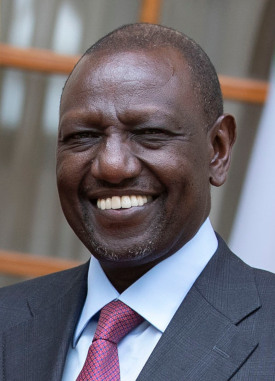
Kenyan President William Ruto led the 2023 Africa Climate Summit in Nairobi. (Photo: Presidenza della Repubblica, Wikimedia Commons)
MEYER: Well, they gathered leaders from the African countries in Nairobi, this was the first ever African climate summit at the leader level. And they did talk a lot about the impacts of climate change on Africa, the impact it's having on their economies, their debt levels, the need for financial relief and the need for ramped up assistance. They called on the developed countries to meet the commitment they made two years ago at the Conference of the Parties meeting in Glasgow, to double adaptation finance from $20 billion to $40 billion a year. And they also called on the World Bank and other multilateral development bank's to ramp up their financial assistance to Africa to deal with the mounting impacts of climate change.
DOERING: And why is it so important to provide that financial assistance both in the form of grants as well as loans Alden?
MEYER: Well, obviously, if it's provided in the form of loans and it's not at a concessional interest rate, it's just adding to the debt burden that a number of these countries are experiencing. Of course, they were already coming off the shock of the pandemic and lower prices for exports of commodities, the impact on tourism, the impacts on their economies. And then that's magnified by the impacts of climate change itself, which has been estimated to cost some of these countries several percent of their GDP just going to respond to climate related disasters. So they really need to see more financial assistance in the form of grants or concessional low interest loans. And that's part of what they called for coming out of the summit.
DOERING: Right, and just so people understand, I mean, what's the interest rate like when an African business tries to get a loan?
MEYER: Well, if you're talking about investments in clean energy technologies, which was another major focus of the summit, looking at wind, solar, or other renewable technologies, oftentimes, governments or companies in Africa are facing interest rates in the high teens, 15, 16, 18%, sometimes even 20%, compared to the low single digits for the United States, Europe, other developed countries. And what that does is given the fact that these technologies, they don't have fuel costs, but they're more expensive upfront, they have higher capital costs, sometimes that makes these projects pencil out as not economically viable. And they're not able to attract foreign investors to put money into the renewable energy transition. So that was another big focus of the summit, was the need for financial intermediaries like the World Bank to help reduce the perceived risk of private sector investment in Africa for the clean energy transition.
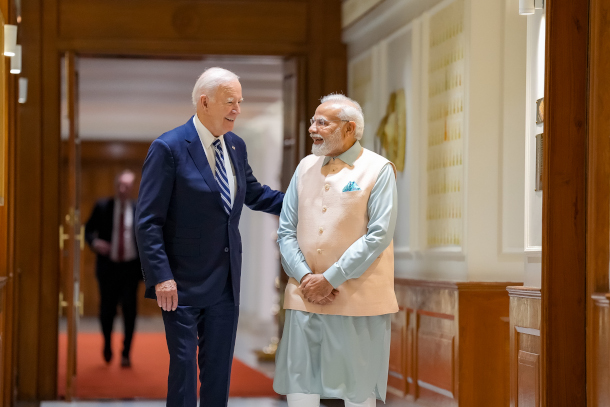
President Biden and Prime Minister Modi of India during the 2023 G20 Summit hosted in Delhi. (Photo: Office of the President of the United States, Wikimedia Commons, public domain)
DOERING: To what extent was fairness a part of this summit and the discussions there? I mean, you know, just the fact that Africa is facing some of the worst impacts of climate change but it really is contributing the least.
MEYER: That really was a major theme running through this, the fact that Africa, as you said, is experiencing devastating climate impacts. The climate is actually changing more rapidly in Africa than other places in the world. And they don't have the resources to cope with those impacts. And they had very little to do with creating this problem in terms of historical emissions. So there is an element of equity, fairness, climate justice, call it what you want running through this, that really did come out from leaders and from the Nairobi Declaration.
DOERING: Now I understand that renewable energy was a pretty important discussion at the G20 Summit, which just wrapped up in India. The 20 largest economies of the world came together to meet there. So what were some of the key takeaways at the G20?
MEYER: Well, renewable energy was a success, they were able to overcome some of the divisions they experienced back in July at the ministerial meetings of energy ministers and climate and environment ministers and get agreement on a goal of tripling global renewable energy capacity by 2030. Of course, just like with the African climate summit that carries with it the need for implementation strategies, particularly finance, but also access to critical minerals needed for batteries, electric vehicles, solar photovoltaics, other technologies, issues like integrating renewables into the power grid in countries around the world workforce development, etc. On the other their hands they were unable to reach any agreement on the need to phase down production and use of fossil fuels. The most they were able to do was reiterate the language from last year's G20 Leaders Summit in Bali, Indonesia, calling for countries to phase down unabated coal power generation. They weren't able to extend that to include oil and gas.
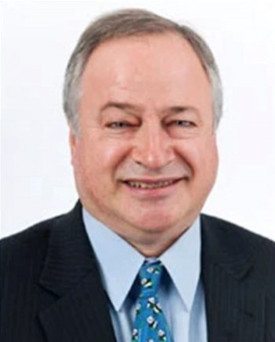
Alden Meyer is a Senior Associate at E3G working on US and international climate policy and politics. He is a Principal at Performance Partners, which provides a range of consulting services to clients in government, business, and the non-profit sector. (Photo: Courtesy of Alden Meyer)
DOERING: Now Alden a climate ambition Summit is set to take place in New York on September 20th, and UN Secretary Antonio Guterres will host the event. What can we expect to see there?
MEYER: Well, he has laid out a very bold ambition acceleration agenda, which calls for countries to reach net zero emissions by 2040 for developed countries like the US and Europe and by 2050 for developing countries like India, China and others. That's a very ambitious timeline. He's called for the phase out of coal power generation by 2030 for developed countries, 2040 for developing countries. He's called for eliminating the massive subsidies that go to production and consumption of fossil fuels from taxpayers around the world. It remains to be seen what new commitments will be made at that summit, they have announced that over 100 leaders have accepted the invitation to attend but they have not indicated which of those leaders are going to put new commitments on the table. He is saying that to get a speaking slot at the meeting next Wednesday, you will have to have something new to say, you're not just going to automatically be given your three minutes to say whatever you want, you've got to bring something significant to the table, so we will see. And of course, this summit is not just for national leaders, it's also for governors, mayors, business leaders, other sub national leaders to also talk about what they're doing. And in many cases, the provinces, the states, the cities, the companies are doing more than many national governments when it comes to decarbonizing their operations and making investments in clean technology. So there's a good story to be told there, but a lot still remains to be seen about what exactly will come out of this summit next Wednesday. So we will be watching this with great interest.
DOERING: Alden Meyer is a senior associate with E3G and a longtime veteran of the UN climate negotiations. Thank you so much for taking the time with us today.
MEYER: It was great to talk to you Jenni.
Related links:
- Learn more about the Africa Climate Summit
- Premium Times Nigeria | “Africa Climate Summit 2023: Key Highlights of Day 2 Events”
- Learn more about the G20 Summit
- BBC | “What Is the G20 and What Was Achieved at the Delhi Summit?”
- Learn more about the Climate Ambition Summit
- About Alden Meyer
- Climate Action Network International | “Civil Society Reactions to the G20 Summit Statement from New Delhi, India”
[MUSIC: No Em Pingo d’Agua, “Assanhado” on Domingo na Geral, by Cristovão Bastos, Lumiar]
Protecting Mediterranean Sea Life
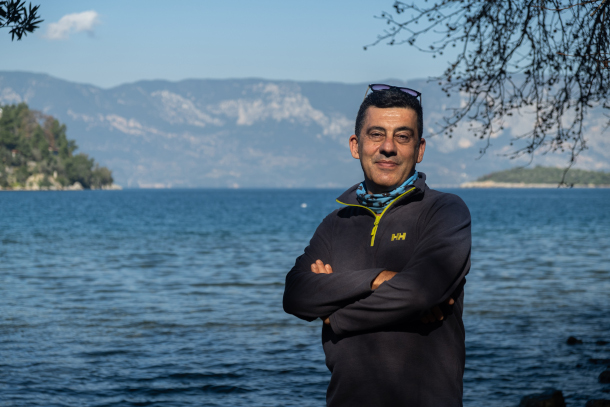
Zafer Kizilkaya, the winner of the 2023 Goldman Environmental Prize for Asia, is fighting to protect Turkey’s coastal ecosystems. (Photo: Goldman Environmental Prize, used with permission)
CURWOOD: The Mediterranean Sea covers less than one percent of the world’s ocean surface yet is home to as much as 18% of all known marine wildlife. And endangered species from the Mediterranean monk seal to the sandbar shark, breed and feed in Turkey’s Gokova Bay. But a combination of overfishing, warming oceans, invasive species, and unsustainable tourism has threatened these populations for years. So, a civil engineer and diver named Zafer Kizilkaya got together with local fishermen in Gokova Bay to pilot a community-run Marine Protected Area. The Turkish government saw the success of the project and expanded the country’s marine protected areas to include 310 miles of coastline. Mr. Kizilkaya was awarded the 2023 Goldman Environmental Prize for Asia for his work, and he spoke with Living on Earth’s Bobby Bascomb.
BASCOMB: First of all, congratulations on winning the Goldman Prize!
KIZILKAYA: Thank you very much. Yes, this is a big surprise for me.
BASCOMB: So tell us more about the threats to Turkey's Gökova Bay. What are your concerns that led you to take on this project?
KIZILKAYA: So the illegal fishing and overfishing at the beginning was the biggest damage. And then comes the climate change impact. Because of the enlargement in the Suez Canal, there are more invasive species easily passed through, and more than 60, 65% of the catch during the summertime are just invasive species. And then when you go underwater, you totally lost your micro algae cover, which harbors so many small fish, crustaceans and other organisms. So it's like waking up one morning, there are no trees left in the country. But if this happens underwater, nobody notices that and thinks that this is normal. So we are just shifting our baselines. What we have seen today as a normal--it is not.
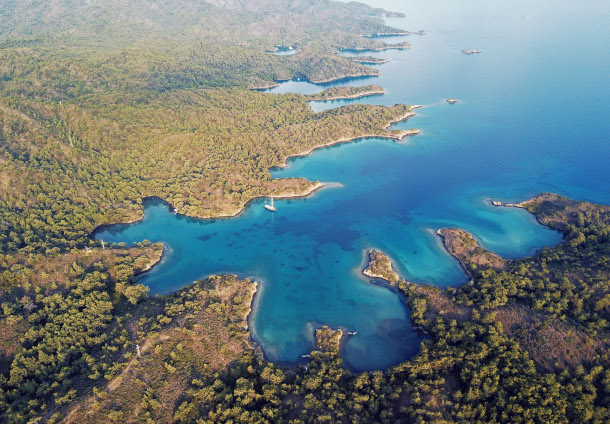
In 2012, Mr. Kizilkaya led the effort to establish Turkey’s first community-managed Marine Protected Area, which aimed to restore the vibrant ecosystems of Gökova Bay. (Photo: Zafer Kizilkaya, used with permission)
BASCOMB: And you've been working on this problem for quite a while now. Back in 2012, I understand, you created Turkey's first community managed Marine Protected Area. Can you tell us about that, please? You know, how does a community manage a Marine Protected Area? How does that work?
KIZILKAYA: We established our own ranger system with support of the Coast Guard. We just asked fishing community members, because fisheries were already collapsed in some extent, anybody who would like to become a ranger, you're always welcome. So a couple of volunteers came, they quit fishing, they sold their boats. So we trained them, we equipped them with the high tech systems. We are just reporting the deliberate illegal fishing activities. And the Coast Guard came later and find those people. So the system at the beginning kind of had a difficulty because people didn't like the idea being under control by rangers, and especially the people they know of. Other fishers saw the increase in fish catch. And they noticed that okay, this protected area's working very well for sustainable fishing. So they are our number one supporters. They're just reporting us any kind of illegal activities.
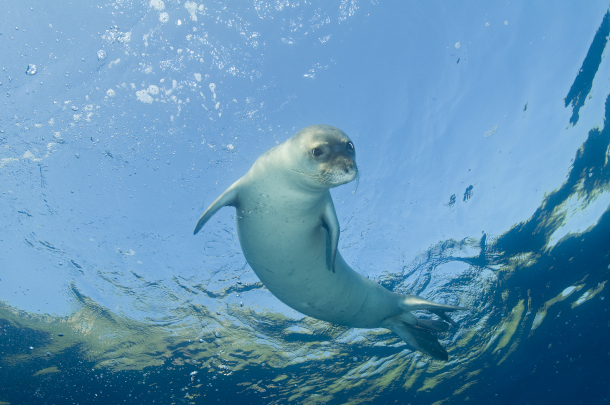
Gökova Bay and the rest of the Turquoise Coast provide habitat for endangered species like the Mediterranean monk seal. (Photo: Zafer Kizilkaya, used with permission)
BASCOMB: So from what I understand that first Marine Protected Area that you worked on worked out very well. And fishermen saw an increase in their catch, and the community is happy with it, it's improved the ecosystem. How did that experience inform your decision to move forward with this much larger Marine Protected Area that you took on in 2020, and for which you've won the Goldman Prize?
KIZILKAYA: Yeah well you know, among fishers, the gossips are the very efficient way of communication.
BASCOMB: I think it's not just fishers.
KIZILKAYA: Okay. So they heard that the people were catching a lot of fish in Gökova. And then we heard that they would like to talk with us, they would like to have the same model. Of course, these are not that easy, because there's so many stakeholders, including industrial fishers, which are always against the all kinds of conservation efforts, because you know, they have been doing free for all, there are no boundaries for them. They have a very strong lobby, on the government side. So it's not easy to establish those areas. But the Gökova at that point was a leverage for us. So governments saw that, okay, that's a kind of a good model, because they're looking from the perspective that the biodiversity will increase, we are saving flagship species. And at the same time, the community is also having continuous fish supply.
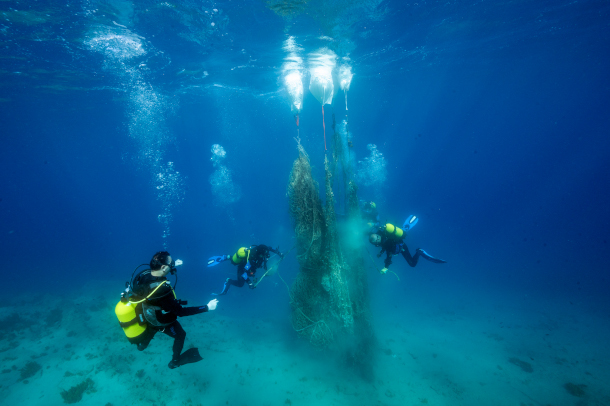
The scourges of overfishing, invasive species, and climate change threaten the Turquoise Coast’s ecosystems. Here, divers clean up a mass of abandoned fishing nets. (Photo: Zafer Kizilkaya, used with permission)
BASCOMB: And in your opinion, why are Marine Protected Areas the best way to address, you know, these many challenges facing marine ecosystems?
KIZILKAYA: So fully protected areas, when there is appropriate enforcement, we noticed that, you know, within three to five years, more than tenfold increase in the fish biomass. And at the beginning, we have only one or two Mediterranean monk seals in the whole bay. Right now, we just identified 11 monk seals, because there are a lot of fish in the protected areas. So they know that there's a food source there. And also the sharks, their breeding area are under protection. And every day we have patrolling there. So you can easily notice that the sea is just, the nature is coming back so fast. So it's not that difficult. You know, we're talking about 1% of the ocean's surface under protection right now. You know, if we can increase this to 20 in the real sense, we could save the entire future of oceans, you know, marine biodiversity and the fisheries at the same time.
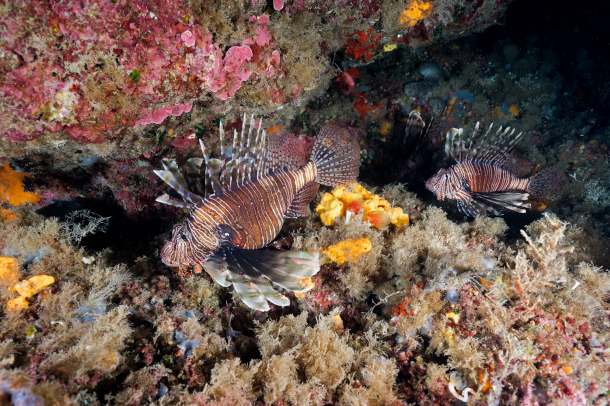
Mr. Kizilkaya says invasive species make up a big portion of local fishers’ catch. He’s worked with chefs to find ways of including species like lionfish on restaurant menus. (Photo: Zafer Kizilkaya, used with permission)
BASCOMB: And so the idea, the basic idea behind a Marine Protected Area is this is a spot that's set aside where there's no fishing or very limited fishing. And I would imagine then you have this spillover effect, you know? If fish are allowed to grow to their full capacity and reproduce to their full capacity, I mean, it only improves of course, that area, but areas around it as well in terms of you know, catch available to people and the health of the ecosystem more broadly.
KIZILKAYA: This is exactly what we have experienced in our case, because in the last 10 years, the income of small scale fishing in Gökova Bay is just increasing steadily. It's still going up. So that means it is working, and it keeps working. And when you look at the sizes of the fish, there is a huge difference, certain sea breams, which were 10 years ago, only 15 centimeters. Now they're 40, 50 centimeters. So this is such a great model in our hand, why we cannot replicate this?
BASCOMB: What's next for you? What conservation projects do you see in your future? And how might winning the Goldman Prize inform those choices and allow you to do your work going forward?
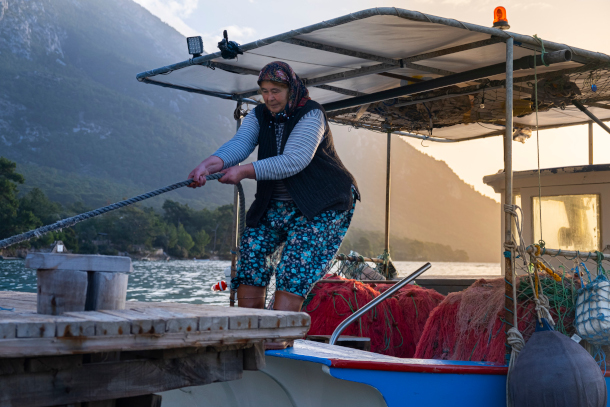
Mr. Kizilkaya partnered with local fishers to create Marine Protected Areas managed by the communities that depend on them. (Photo: Omer Ozyilmazel, used with permission)
KIZILKAYA: The biggest challenge right now we are facing--the climate change impact, because the water temperatures have been rising. And in the last 10 years, we have at least 10 invasive tropical species coming from the Red Sea, you know, changing the entire fishing industry. So we tried to start a project buying invasive species from the small scale fishers and just selling to the seafood industry and restaurants. And there was a big demand started. So it's a kind of campaign that we have been working on right now. And the next part, that expanding the protected areas more and more, because not in the all protected areas right now we have enforcement. There's a huge capacity to do that. Turkish coastline is almost 9,000 kilometers, one of the biggest in the Mediterranean. And I believe that you know, the leverage of Goldman Environmental Prize will help this achieving on that.
BASCOMB: Well, I wish you the very best of luck in all of your future work and thank you for the work that you've done so far.
KIZILKAYA: Thank you so much.
BASCOMB: Zafer Kizilkaya is this year's Goldman Prize winner for Asia. Thank you so much for taking this time with us today.
KIZILKAYA: Thank you.
CURWOOD: Zafer Kizilkaya spoke with Living on Earth’s Bobby Bascomb.
Related links:
- The Goldman Environmental Prize | “2023 Goldman Prize Winner Zafer Kizilkaya”
- Learn more about the Akdeniz Koruma Derneği (Mediterranean Conservation Society)
- CNN | “Environmental Hero’s Mission to Save The Most Over-Fished Sea in The World.”
[MUSIC: Rhiannon Giddens, “Black Is the Color” on Tomorrow Is My Turn, traditional American/arr.Rhiannon Giddens, Nonesuch Records]
DOERING: Just ahead – a remembrance of Rosamund Zander as we look back to the enduring optimism of Antarctic explorer Ernest Shackleton for inspiration in a troubling time. Keep listening to Living on Earth.
ANNOUNCER: Support for Living on Earth comes from Friends of Smeagull the Seagull and Smeagull’s Guide to Wildlife. It’s all about the wildlife right next door to you! That’s Smeagull, S - M - E - A - G - U - L - L, SmeagullGuide.org.
[CUTAWAY MUSIC: Rosalyn Tureck, “Partita No.1 in B flat, BWV 825” on Great Pianists of the 20th Century-Rosalyn Tureck, by Johann Sebastian Bach, Philips/EMI Records]
Beyond the Headlines
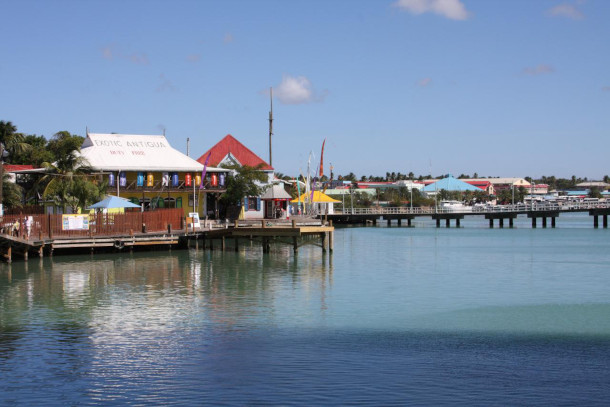
A group of island nations, including Antigua and Barbuda, is asking an international court to recognize greenhouse gases as marine pollution. (Photo: Derek Hatfield, Flickr, CC BY 2.0)
CURWOOD: It’s Living on Earth, I’m Steve Curwood
DOERING: And I’m Jenni Doering.
It's time now for a look beyond the headlines with Peter Dykstra. He's Living on Earth's contributor and he joins us from Atlanta, Georgia. Hey, Peter, what you got for us this week?
DYKSTRA: Hi, Jenni. We're looking at a group of small island nations, the people on the front lines of potential and current damage from climate change and sea level rise. They are pinning their hopes on an international court opinion in which they hope that greenhouse gases can be considered to be a form of marine pollution. That opinion would come from the International Tribunal for the Law of the Sea in Hamburg.
DOERING: Right, I guess it's, you know, not necessarily as obvious as plastic pollution, that kind of thing. But those climate changing greenhouse gases, like carbon dioxide and methane, are warming the oceans, making them expand, and sea levels rise, and they're even acidifying the ocean because of all the CO2 that's being taken up by it, Peter.
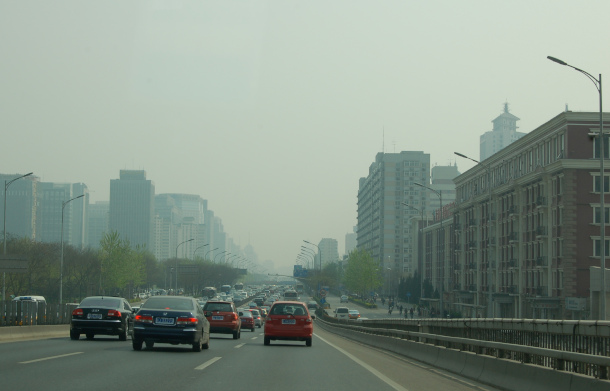
The EPA will delay an update of pollution standards for ground level ozone, a major component of smog. (Photo: dominiqueb, Flickr, CC BY-NC-ND 2.0)
DYKSTRA: The oceans are beginning to be a mess, simply stated. This decision under the Law of the Sea could be a step forward for some form of protection for island nations that are too politically small to fend for themselves against the larger nations, which of course are by far the larger polluters in greenhouse gases.
DOERING: What else do you have for us this week, Peter?
DYKSTRA: The US EPA is reportedly delaying its plans to tighten air quality standards for smog. The official name for smog, of course, is ground level ozone, it generally comes from tailpipes. Even though scientific advisory panels to EPA said it would be an important measure to protect human health.
DOERING: Okay, so what's with the delay, Peter?
DYKSTRA: Politics, perhaps? There's obviously a lot of politics that gets played with environmental decisions. This time, it's a Democratic administration. And the democratic appointee to EPA, Administrator Michael Regan, said that more study is needed. That more study may well carry any decision past the 2024 presidential election, and therefore, it's deemed to be a political hot potato.

On September 12, 1992, Mae Jemison became the first Black woman to go to space. (Photo: Prachatai, Flickr, CC BY-NC-ND 2.0)
DOERING: So what does this mean for public health? I mean, if improving these standards keeps getting delayed, Peter?
DYKSTRA: Well, the EPA's own science panels have said that this is essential for public health. Smog is a serious pollutant causing asthma and other respiratory woes. There are other studies, there was one done in the state of Michigan, back in March, that linked smog to depression in young people, and a slew of other studies that say that this is bad stuff. But it's still prevalent in cities. And it's a dangerous thing by any scientific measure that's been taken.
DOERING: Feels like we're kind of stuck in the past with some of these pollution standards. But speaking of the past, what do you have for us from the history books this week?

The actress Nichelle Nichols portrayed Lieutenant Uhura in the original Star Trek series. Off-screen, she became an advocate for women and minorities in space alongside Jemison. (Photo: Wasfi Akab, Flickr, CC BY-NC-ND 2.0)
DYKSTRA: September 12th, 1992, the first African American woman is launched into space with her crew on the space shuttle. Mae Jemison became a pioneer and stayed a pioneer and an exemplar for other women and minorities to consider a career in space. She's done that to this very day. She's now in her 60s, and she was accompanied by another exemplar who won't travel into space for another 200 years on the Starship Enterprise. And that, of course, is the actress Nichelle Nichols, who played Lieutenant Uhura, one of my first boyhood crushes, on the original Star Trek show, and another evangelist for putting more women and more minorities in space. She passed away a little over a year ago. And Mae Jemison also appeared on a later edition of Star Trek, so they've almost reversed roles.
DOERING: Mmm. And both breaking huge glass ceilings in the process. Thank you so much, Peter. Peter Dykstra is Living on Earth's contributor and we'll talk to you again next week.
DYKSTRA: All right, Jenni, live long and prosper.
DOERING: You too. And there's more on these stories on the Living on Earth website. That's loe.org.
Related links:
- The New York Times | “Island Nations Hope for Court’s Help on Climate’s Effects”
- The Associated Press reports on the EPA’s delay
- Read more about Mae Jemison
[MUSIC: Boston Symphony Orchestra, “In memoriam: “Nimrod” from Elgar’s "Enigma" Variations” performed in memory of Sir André Previn]
Enduring Against Seemingly Impossible Odds

When ‘Endurance’ got trapped in sea ice, the crew aboard the ship kept their minds and bodies occupied by keeping up with their daily activities. (Photo: Manchester City Council, Flickr, CC BY NC ND 2.0)
CURWOOD: Living on Earth and the world have lost an amazing and thoughtful friend, Rosamund Stone Zander. Roz, as she called herself, recently died while swimming with her husband Hansjörg Wyss off an island called Vinalhaven on the Maine Coast.
Roz was a powerhouse supporter of conservation and musical performance, and a gifted landscape artist. But perhaps her biggest impact was promoting leadership and relationships with her insights as a therapist to bring hope to dire situations, such as the climate emergency, the pandemic and today’s political turmoil. Roz said it’s crucial to work in ways that maximize the chances of having a good outcome when getting through hardship. It’s not enough to just think positively, she warned. One must take direct action and seize every opportunity to make things better. The key is the concept of possibility, and it’s helpful to hear stories of people who survived extreme difficulties and how they did it. Roz Zander’s book is titled Pathways to Possibility: Transforming Our Relationship to Ourselves, Each Other, and the World. When we spoke in October of 2020, I asked her to share a story from her book where the power of possibility resonates with efforts to deal with the many overwhelming challenges of today.
ZANDER: Well, it may seem odd to you, but I think of a story about Ernest Shackleton. He was a British explorer, and living in the beginning of the 20th century. And he had an idea that he wanted to go explore the Arctic. And the first thing he did was to put out a job description. I'm going to read you his job description "men wanted for hazardous journey, small wages, bitter cold, long months of complete darkness, constant danger, safe return doubtful, honor and recognition only in case of success."
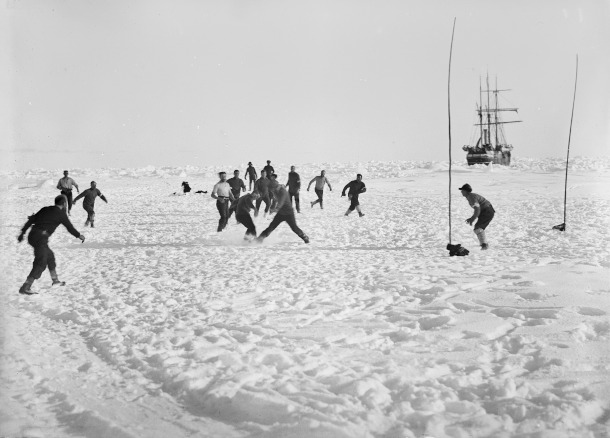
Men from the ship’s crew playing soccer while the ‘Endurance’ was trapped in sea ice. (Photo: Manchester City Council, Flickr, CC BY NC ND 2.0)
CURWOOD: [Laugh] So that sounds very difficult. Why? Why was it going to be so difficult?
ZANDER: Well, he got 28 men signing up with that kind of advertisement. They must have had a lot of adventuresome thoughts, but it was much more difficult than they expected. And they set sail in Shackleton's boat, which was called the Endurance quite appropriately on August 6 1914, from the coast of England. Four months later, they were heading south on the coast of Antarctica and hit dense polar ice. By the end of January, the boat got totally trapped in the pack ice. And they had to wait there for 10 months patiently for a thaw in the ice because they couldn't move. After 10 months, the ice crushed the ship. Are we looking for troubles?
CURWOOD: Okay, yeah.
ZANDER: So these 28 men camped on the ice for five more months, waiting for open water and enduring terrible hardships. Finally, they were able to sail their three lifeboats which they had rescued from the crushed ship to an uninhabited piece of rock called Elephant Island from which there was absolutely no hope of rescue.
CURWOOD: So no way to get off this island, huh?
ZANDER: No way to get off, except that they had their lifeboats. And Shackleton acted very quickly, because he knew that men were almost at the end of their ropes here. And he took five of them in a 22 foot lifeboat and set out on an impossible 800 mile journey through the world's worst seas at the worst time of year.
CURWOOD: What about the men who are being left behind? I mean, here they are, in this very difficult place their leader has left in this boat kinda doubtful the boat's going to get anywhere successfully. I mean, this is complete desolation.
ZANDER: It is, and they were left in the charge of Shackleton's first mate named Frank Wilde. And he understood how to lead men. And so as the men were waiting on the shore and watching the boats go off in the distance, some of them got tears in their eyes. And Frank Wilde got them to work immediately.
CURWOOD: So I guess we know this story because Shackleton must have had some success with that tiny boat on those big seas.
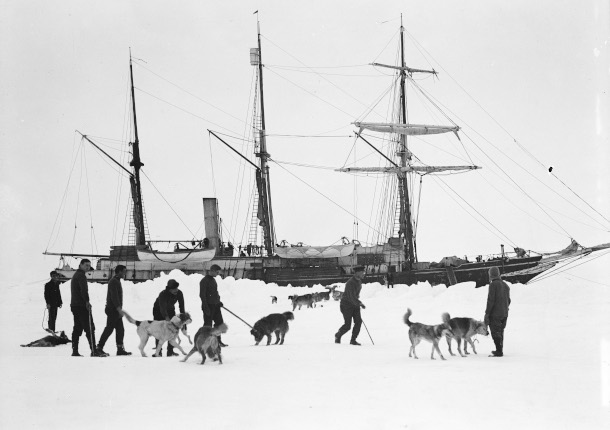
The Endurance, trapped in sea ice along the Weddell Sea. (Photo: Manchester City Council, Flickr, CC BY NC ND 2.0)
ZANDER: You're right. You know, the ending is going to be good, but it still has some lessons in it. So Shackleton realized they had to act quickly to get help. And so he took off in a 22 foot lifeboat, with five men, leaving the others behind. He set out on an impossible 800 mile journey through the world's worst seas, and that the very worst time of year. They aim for the nearest populated territory, which was South Georgia Island, and its whaling station. And they got there, but they landed on the wrong side of the island.
CURWOOD: Oh, oh.
ZANDER: And had to climb 26 miles over the mountains and over the glaciers to get to the whaling station. It's hard to believe. They were hardly recognizable by the people working in the whaling station. They were so emaciated, they hardly looked like human beings. And then of course, Shackleton knows he's left 23 men behind and he gets into a sea worthy boat as soon as he can, and goes back the 800 miles to elephant Island.
CURWOOD: So what was the condition of those men who've been left behind?
ZANDER: Well they had suffered injury and infection, hypothermia, attacks by an elephant seal near starvation, completely unspeakable conditions. But not one member of the original 28 man crew was lost, not one, But see how is that possible, really? That's the question. And our best clue is that Shackleton remained consistently positive in his outlook and forbid the expression of negativity or despair. He declared, and I love this, he declared that optimism is the true moral courage. Optimism is the true moral courage. Both Shackleton and Frank Wilde understood that they had to be completely disciplined with the men in keeping them from saying anything negative or going into despair, because that's the way they would survive. If there was a negative story hanging around and people were playing with it, "are we gonna make it?" they would very likely all have died in a short order time.
CURWOOD: So Roz why is it that in times of peril and stress, our minds tend to wander towards the negative thoughts instead of immediately jumping in to optimism?
ZANDER: Well, because we're wired that way. I mean it is a fear response, negativity is a fear response. You can't help but think of the possible dangers. Nature wants you to do that up to a point. But in such a time as COVID, or such an adventure as Shackleton's, it isn't useful. And you can overcome that wiring. But it takes discipline and effort to overcome it, you have to stay consistent of saying, tomorrow will be a better day. And that's the truth, as we know it.
Rosamund Stone Zander is the author of Pathways to Possibilities: Transforming Our Relationship with Ourselves, Each Other, and the World. (Photo: Courtesy of Rosamund Stone Zander)
CURWOOD: So when it comes to optimism, how important is it to be active about this as opposed to you know, just having an optimistic attitude and, and sitting there?
ZANDER: Well, it's very important because it's a discipline, what you're doing in optimism is overriding the wiring that we are given at birth, and to override wiring, it doesn't actually take you running around but it does take mental activity to do that. And then of course, telling other people to do the same. It's making a community keeping a conversation going, that lifts others as well and it does wonders for the immune system. actually. If you have a group of people who are all speaking in possibility, their physical state is different than those who are all in despair, it's completely different. And their immune systems are strengthened by optimism, not by positive thinking, not by lying to themselves. And optimism and positive thinking are quite different positive thinking occurs when you really know that something is bad, but you're hoping it will not be and you're going to pump yourself up to say it isn't but that's a lie. Positive Thinking is a lie. Optimism in the face of you could die or you could live the options are open, the future is open, you don't know the answer so that's not a lie that kind of optimism.
CURWOOD: Let's go back to Shackleton for a moment. How would the situation with Shackleton's men differed if they'd act based on positivity and not optimism? Do you think?
ZANDER: Well, the thing is that it's a lie and therefore it would show through. Somebody would be going into despair, and not know what to do about that. Whereas every man on this journey, knew what to do. They had to speak the story of survival that we are going to survive. And what happened was that they became very collaborative and when one man spilled his cup of milk four others rush to fill it up again, even though they were all starving.
CURWOOD: Rosamund Stone Zander, speaking about her book Pathways to Possibility: Transforming our Relationship with Ourselves, Each Other, and the World. Roz recently died while swimming in her favorite cove in Maine. Her good humor, generosity, and friendship with so many in the world of conservation and elsewhere are deeply missed.
Related links:
- Learn more about Rosamund Stone Zander
- Learn more about Ernest Shackleton
[MUSIC: Yo-Yo Ma, “Bach: Cello Suite No. 3 in C Major, Bourrée I and II” on Six Evolutions – Bach: Cello Suites, Sound Postings LLC]
CURWOOD: Living on Earth is produced by the World Media Foundation. Our crew includes Naomi Arenberg, Paloma Beltran, Josh Croom, Swayam Gagneja, Mattie Hibbs, Mark Kausch, Mark Seth Lender, Don Lyman, Sarah Mahaney, Aynsley O’Neill, Sophia Pandelidis, Jake Rego, El Wilson, and Jolanda Omari.
DOERING: Tom Tiger engineered our show. Alison Lirish Dean composed our themes. You can hear us anytime at L-O-E dot org, Apple Podcasts and Google Podcasts, and like us, please, on our Facebook page - Living on Earth. We tweet from @livingonearth. And find us on Instagram at livingonearthradio. And you can write to us at comments at loe dot org. I’m Jenni Doering.
CURWOOD: And I’m Steve Curwood. Thanks for listening!
ANNOUNCER: Funding for Living on Earth comes from you, our listeners, and from the University of Massachusetts, Boston, in association with its School for the Environment, developing the next generation of environmental leaders. And from the Grantham Foundation for the protection of the environment, supporting strategic communications and collaboration in solving the world’s most pressing environmental problems.
ANNOUNCER 2: PRX.
Living on Earth wants to hear from you!
Living on Earth
62 Calef Highway, Suite 212
Lee, NH 03861
Telephone: 617-287-4121
E-mail: comments@loe.org
Newsletter [Click here]
Donate to Living on Earth!
Living on Earth is an independent media program and relies entirely on contributions from listeners and institutions supporting public service. Please donate now to preserve an independent environmental voice.
NewsletterLiving on Earth offers a weekly delivery of the show's rundown to your mailbox. Sign up for our newsletter today!
 Sailors For The Sea: Be the change you want to sea.
Sailors For The Sea: Be the change you want to sea.
 The Grantham Foundation for the Protection of the Environment: Committed to protecting and improving the health of the global environment.
The Grantham Foundation for the Protection of the Environment: Committed to protecting and improving the health of the global environment.
 Contribute to Living on Earth and receive, as our gift to you, an archival print of one of Mark Seth Lender's extraordinary wildlife photographs. Follow the link to see Mark's current collection of photographs.
Contribute to Living on Earth and receive, as our gift to you, an archival print of one of Mark Seth Lender's extraordinary wildlife photographs. Follow the link to see Mark's current collection of photographs.
 Buy a signed copy of Mark Seth Lender's book Smeagull the Seagull & support Living on Earth
Buy a signed copy of Mark Seth Lender's book Smeagull the Seagull & support Living on Earth

